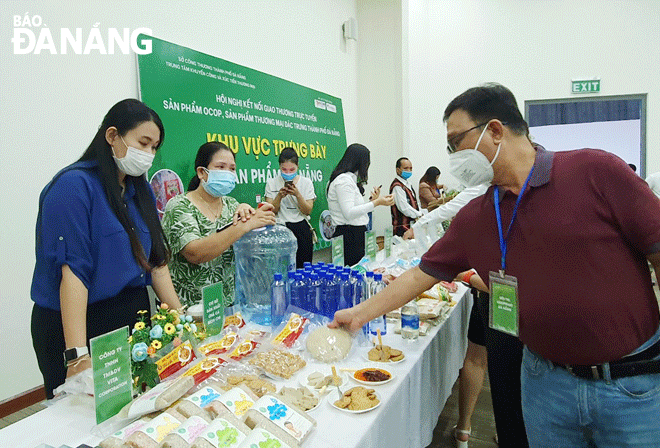3-star OCOP products create a foothold in market
Production facilities and cooperatives specialising in ‘One Commune – One Product’ (OCOP) goods across Da Nang have quickly resumed their operations after a long hiatus triggered by the unexpected COVID-19 surge. How to both maintain production pace and ensure product consumption is not ‘a piece of cake’ for many OCOP establishments for the time being.
 |
| Bich Chi fish cakes are on display for sales at programme highlighting OCOP products made in Da Nang and the provinces of Phu Yen and Kon Tum at the Da Nang Exhibition and Fair Centre, October 22, 2021, Photo: QUYNH TRANG |
About 10 days ago, the working atmosphere at the Thao Sinh ‘cha’ (meat paste roll cakes) factory located in Hoa Khe Ward, Thanh Khe District was much bustling. New batches of beef, pork, and chicken rolls are, in a prompt manner, packaged, labeled and delivered to local retail traders or sent to distributors in other provinces and cities for consumption.
Mr. Nguyen Phi Sinh, the owner of this facility, complained that, during the days of practicing the previous ‘stay-at-home’ order, the consumption of products decreased by 80%. However, this disadvantaged fact prompted him and his wife to come up with the idea of creating new products in a bid to meet the diverse needs of customers. In particular, ‘cha da’ (steamed rolls mixed with shredded pork skin) is the most favourite to him.
In a similar vein, the Bich Chi ‘cha ca’ (fish cake) production facility located in Tam Thuan Ward, Thanh Khe District in recent days has observed a bustling working ambiance from the early morning to night. Workers have always worked during odd hours to chuck out fresh products.
As revealed by Ho Thi Chi, the owner of the facility, the daily production output of the facility has recovered to 70% as compared to the pre-pandemic time. The main products are fried and fish cakes of good quality that have always received many compliments from partners, retailers and individual customers.
More recently, Chi has received a number of invitations for cooperation, display and supply of products to stores and supermarkets.
“Our fish cake has been certified with 3-star OCOP in 2020. I am paying more attention to design and packaging, instead of just focusing on quality as before. Hopefully, in the future, there will be opportunities to cooperate with larger partners for the expansion of consumer markets” said Chi.
In fact, many OCOP products have been recognized for their quality and accepted for sale by many food stores, whilst only few ones have entered large retail system.
Deputy Director of Co.opmart Da Nang Supermarket Le Quang Thanh said that his unit has always given the priority to putting more OCOP and typical commercial products onto the shelves of this reputable supermarket chain.
However, some OCOP products often fail to meet strict requirements on product records, eye-catching designs/packaging and food preservation process.
“If OCOP production facilities meet criteria, we are ready to support product consumption and open display booths for sale, affirmed Thanh.
There are more and more clean food stores and shops selling OCOP and typical commercial products made in Da Nang, thereby meeting people's consumer demand for using clean food with clear origin.
Moreover, the quality of such products has turned more stable and on way to gain more popularity thanks to great support and trust from consumers.
According to Ms. Vo Thi Thu Thuy, Director of Go! Supermarket, this trade unit has always maintained its stance on operating sales areas for OCOP.
The Da Nang Department of Industry and Trade will set up OCOP product selling centres and stores, and launch OCOP product promotion campaigns.
Meanwhile, the Department of Science and Technology will map out plans for intellectual property development programmes in Da Nang until 2030, including products associated with the OCOP programme, and guiding businesses how to register for intellectual property rights and access trademark development consultancy, labeling, the use of bar codes and traceability.
The OCOP model made its debut in 2008 in Viet Nam, following the model of Japan-initiated ‘One Village, One Product’ and Thailand-developed ‘One Town, One Product’.
It is an economic development programme for rural areas focusing on increasing internal power and values, which is also meant to help with the national target programme on upgrading rural areas.
Reporting by QUYNH TRANG – Translating by A. THU